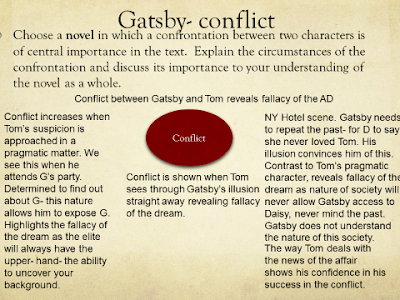FOR NEXT WEDNESDAY!!! (20th)
Complete the understanding questions consolidation sheet handed on out Wednesday.
See below for a copy of tasks:
USING YOUR OWN WORDS
Practise
‘using your own words’ questions:
1.
Myself,
my family, my generation, were born in the world of silence; a world of hard
work and necessary patience, of backs bent to the ground, hands massaging the crops,
of waiting on weather and growth; of villages like ships in empty landscapes
and long walking distances between them; of white narrow roads rutted by hooves
and cartwheels, innocent of oil or petrol, down which people passed rarely, and
almost never for pleasure, and the horse was the fastest thing moving.
Question
i)
What kind of agricultural work did the author’s family
do during his/her childhood? 2
ii)
What further clues are there to what village life was
like at the time. 3
2.
The
BBC is a massive sponsor, uniquely independent through its licence fee – and
the guardian of public service broadcasting.
But, as the fight for the control of communications hots up, friends of
the BBC – both inside and out – are alarmed that all this is in jeopardy: the BBC has become too much of a self-seeking
institution, too preoccupied with its ratings at the expense of good
broadcasting, and unwisely over-extended financially.
Question
What are the three reasons for causing alarm to friends of the BBC? Use your own words as far as possible.3
CONTEXT QUESTIONS
Key
strategies:
1. You
will be asked to explain the meaning
of a word and show how sentences
surrounding this word helped you to arrive at this meaning.
You should:
a)
Explain the meaning
b)
Identify the words/phrases which helped you arrive at this meaning
c)
Quote
these words/phrases and explain how they helped you to understand the meaning of the word.
Example
It appears to me undeniable that a people has its individual character,
its peculiar capacity for trust and suspicion, kindness or cruelty, energy or
lassitude.
Question
How does the context in which it is used help you to understand the
meaning of ‘lassitude’? 2
Answer
a)
The meaning of the word is tiredness or exhaustion.
b)
The word is surrounded by a list of opposites: trust or suspicion, kindness or cruelty.
c)
‘Lassitude’ must be the opposite of energy, which is
tiredness or exhaustion.
Example
It seems the childcare
pendulum has swung; the principal threat to children is no longer neglectful
parents, but excessively protective ones who are always worrying about germs.
Frank Furedi, reader in sociology at the University of
Kent, has written a book, ‘Paranoid Parenting’, in which he explores the causes
and far-reaching consequences of too much cosseting: “It is always important to recall that our
obsession with our children’s safety is likely to be more damaging to them than
any risks which they are likely to meet in their daily encounter with the
world,” Furedi writes.
So, far from fretting, like paranoid parents, about
the risks of physical injury, Furedi seems almost nostalgic about them: “Playground areas are now covered with rubber
to limit the damage when a child does fall.”
Question
How does the context in
which it is used help you to understand the meaning of ‘cosseting’?2
Task:
Examine
the following answers to the question above.
Using the marking scheme, above ,allocate marks for these answers.
Answer
1: I think the word
‘cosseting’ means to be over-protective.
The writer quotes Furedi who describes ‘excessively protective parents’
who have an obsession with our children’s safety’. The word excessive has connotations of going
overboard with something as does the word ‘obsession’ which suggests an
unhealthy attention to something, which makes me think that ‘cosseting’ means
to over-protect.
Your mark ________
Answer
2
It
means to be too concerned or over-protective – molly-coddle as the writer talks
about all the ways the parents are over-protective.
Your mark __________
Formula for context questions
If you follow this formula, you should always gain the
full 2 marks for context questions. If
you learn the following words, you can use them every time you try this type of
question.
The expression ‘__________’ as used here means ____________. I can work this out from the context because
it says ‘______________’. This
suggests/means/gives the impression that ___________.
Context Questions
Using the formula for answering these types of questions, give the
meaning of the expressions printed in bold in the following examples and show
how the context helped you to arrive at the meaning.
Silverstein was implacable in pursuing his revenge. After years of patient searching he had
finally come face to face with his father’s tormentor, and he showed no mercy.
Question
Explain clearly in your own words how the context helped you to
understand what the writer means by ‘implacable’.2
1.
For
two days the general vacillated. Should
he give the order to advance, or should he allow his men to cling to their
sturdy line of defence? This hesitation
was to prove fateful.
Question
Give
the meaning of the term ‘vacillated’
and explain how the context helps the reader to arrive at the meaning. 2
2.
One
reason why British theatre is less stuffy now than it was before the Second
World War is that classes or groups who in the 1930s would not often have gone
to the theatre, the young, the students, the more articulate layers of the
working classes and the people of working class origin who have been to
university, all have more money in their pockets.
Question
Explain
clearly what the writer means by ‘the
more articulate layers of the working classes.’ 2
3.
Recently
I found myself unimpressed by some visiting American who stunned me with
monstrous verbosity, determined to use five words where one would do, bent on
calling a canteen an ‘in-plant feeding situation’ and a spade ‘a primitive
earth-breaking implement.’
Question
Show
how the context of ‘monstrous verbosity’
helps you to arrive at its meaning. 2

















